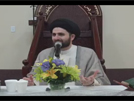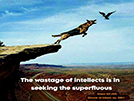Evaluation of extremist view
- Details
- Hits: 1679
Evaluation of extremist view
The view to which these scholars tend is very attractive and of much value so far as it negates ‑all unreasonable and mythical ideas about Allah. But if we evaluate it from the realistic point of view, we find it somewhat extremist. If human knowledge about Allah is so limited that no reference can be made to Him except by means of the word `He', which is absolutely vague, then how have we learnt that He really is?
It appears that the' great scholars who have tended to this view, have mistaken complete and all‑round cognition for the relative one. A thing may have tens of characteristics which distinguish it from other things. By knowing anyone of these characteristics we can identify it and need not have a full knowledge of all its distinctive features. That is not the case with Allah alone, but the same principle applies to all that exists. For example, you have two children. You can recognize each of them easily.
But are you aware of all their physical and moral characteristics.
Hence if it is a question of an all‑round cognition of Allah, we must admit that it is humanly impossible.
But if it is a question of the cognizance of certain of His attributes and such relative knowledge as may distinguish Him from all others, of course man should have such knowledge so that he may be aware of His existence. As a matter of fact without having such knowledge, it is futile to talk of Allah.
Hence our inability to have a complete and all‑round cognition of a reality does not mean that we should express inability to have any. sort of knowledge of it. There is a middle stage, rather there are several intervening stages between an absolute and all‑round cognizance and an absolute and all‑round non‑cognizance viz. "relative cognition from one or more directions".
A careful study of knowledge, its value and its limits shows that human information about this world is mostly relative. For this reason modern science is basically concerned with knowing the features of things and not their essence. The cognition of the Source of Existence also has similar limitations. When an intelligent and well informed person thinks of Allah, he exclaims from the core of his heart; "I don't know what You are; You are what You are".
However the same person when he looks at His signs and at a part of His distinctive marks, he gets somewhat acquainted with Him. Though this knowledge is far lesser than absolute cognition but, while possessing it, one can talk about `Him' with certainty. [3]
It may be said that anybody who believes in Allah, identifies Him at least with one of His attributes by means of which he recognizes Him. The cognizance of Allah is accompanied at least by some such attributes as the Creator, the Sustainer,the Origin, the Self‑Existent etc.
[2] For details see Dr Murtaza Mutahhery's Master and Mastership
[3] Ayatullah Baqir al‑Sadr, He, His Messenger and His Message











